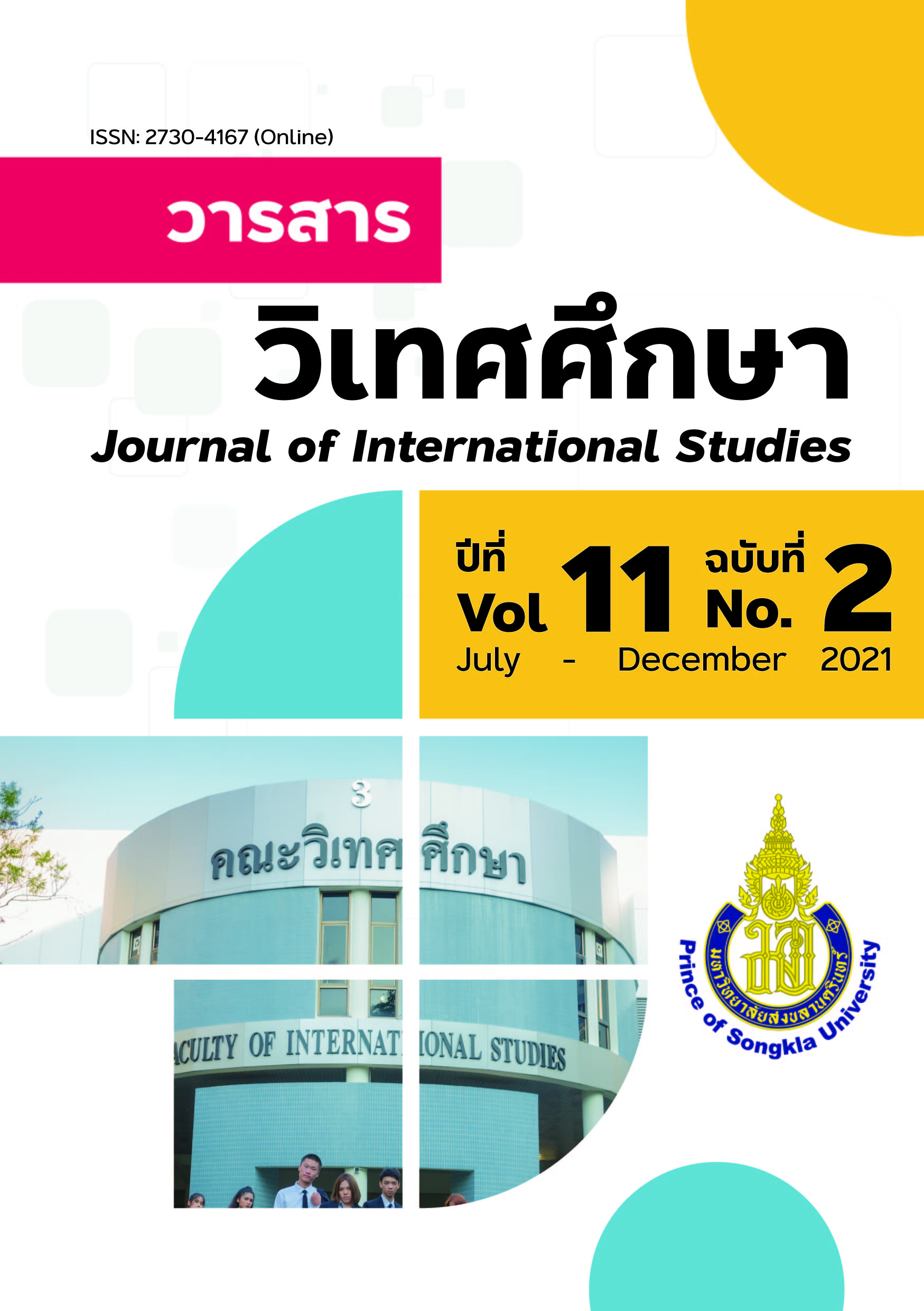Teahouse《茶馆》: A reflection of the grassroots class’ suffering in political instability
Main Article Content
Abstract
Literature is a critical space where author’s sensibility and emotion can be related to reader. Moreover, it can be considered as a mean to state people’s suffering of social hierarchy that caused by external factors. This research’s objective is to present the lower class’ suffering, caused by oppression during political instability in China from a play named Teahouse written by Lao She, a Chinese popular author. The research has found that the play presents the lower class’ circumstance as a reflection of the suffering from being a lower class in China’s political instability in 3 subjects which is the following; 1) Deprivation of liberty in political criticism. 2) Striving to survive 3) Living in despair. Besides, the research also shows that Teahouse can be recognized as an unforgettable history, noting that the ruling class’ difficulty and despair can bring a tragedy in the end.
Article Details
Statements and opinions expressed in articles herein are those of the authors and do not necessarily reflect the position of the editors or publisher.
Article, information, text, image, etc. which are published in Journal of International Studies, belong to Journal of International Studies. If anybody or any organization would like to use part or whole of them, they must receive written permission from Journal of International Studies before usage.
References
ฉัตรทิพย์ นาถสุภา. (2561). ประวัติศาสตร์จีน ค.ศ. 1900-1949. กรุงเทพฯ: สร้างสรรค์.
เทพรัตนราชสุดาฯ เจ้าฟ้ามหาจักรีสิรินธร, กรมสมเด็จพระ. (2563). มองสังคมจีนผ่านวรรณกรรม.กรุงเทพฯ: นานมีบุ๊คส์พับลิเคชั่น.
ธงชัย วินิจจะกูล. (2539). “ความทรงจำกับประวัติศาสตร์ บาดแผล: กรณีการปราบปรามนองเลือด 6 ตุลา 19.” รัฐศาสตร์สาร 19 (3). 181-194.
บาร์ตส์ โรล็องด์. (2558). มายาคติ. กรุงเทพฯ: คบไฟ.
ปัณณวิชญ์ ผสมทรัพย์. (2561. “ความย้อนแย้งในอุดมการณ์และการลิดรอนความเป็นมนุษย์ในเรื่องเล่าบาดแผล เรื่อง Escape from Camp 14.” วารสารมนุษยศาสตร์, 25 (2): 143-179.
ภูสิทธ์ ขันติกุล. (2554). “ทัศนะทางการเมืองและการมีส่วนร่วมทางการเมืองแบบประชาธิปไตยของประชาชนชุมชนเขตดุสิต กรุงเทพฯ.” วารสารวิจัยและพัฒนา, 3 (1): 68-77.
รัชกฤษ วงษ์วิลาศ. (2560). อ่าน 13 บุปผาแห่งนานกิง ของเหยียนเกอหลิงใหม่ ในฐานะตัวบทประวัติศาสตร์สตรีชายขอบ. ใน ปกรณ์ ลิมปนุสรณ์ และศิริวรรณ วรชัยยุทธ (บรรณาธิการ) ,ประชุมวิชาการระดับชาติจีนศึกษามหาวิทยาลัยธรรมศาสตร์ ครั้งที่ 3 ประจำปี พ.ศ. 2560, 19-42. ปทุมธานี: มหาวิทยาลัยธรรมศาสตร์.
วราภรณ์ ตระกูลสฤษดิ์. (2545). จิตวิทยาการปรับตัว. กรุงเทพฯ: ศูนย์ส่งเสริมวิชาการ.
วัชรพล พุทธรักษา. (2561). อันโตนิโอ กรัมชี่ กับการจัดวางความคิดทางการเมือง: ปรัชญาปฏิบัติ การเปลี่ยนแปลงทางสังคม และการปลดปล่อยมนุษย์. กรุงเทพฯ: สมมติ.
วัชรพล พุทธรักษา. (2563). บทสำรวจความคิดทางการเมืองของอันโตนิโอ กรัมชี่. พิมพ์ครั้งที่ 2. กรุงเทพฯ: สมมติ.
วีระชัย โชคมุกดา. (2554). 150 ปี ประวัติศาสตร์จีนยุคป่วยไข้. กรุงเทพฯ: ยิปซี.
ศิริพร แทนสุวรรณ์ และ วรรณนะ หนูหมื่น. (2561). “นัยสำคัญในเรื่องเล่าความเจ็บปวด “ฉันคือเอรี่ กับประสบการณ์ข้ามแดน.” วารสารวิทยบริการ มหาวิทยาลัยสงขลานครินทร์, 29(2): 172-183.
สิทธิพล เครือรัฐติกาล. (2555). ประวัติศาสตร์จีนสมัยใหม่. กรุงเทพฯ: ชวนอ่าน.
เส้าหย่ง หวังไห่เผิง เขียน, กำพล ปิยะศิริกุล แปล. (2560). หลังสิ้นบรรลังก์มังกร. กรุงเทพฯ: มติชน.
เหลาเส่อ เขียน, สมเด็จพระเทพรัตนราชสุดาฯ สยามบรมราชกุมารี แปล. (2558). ร้านน้ำชา. กรุงเทพฯ: นานมีบุ๊คส์พับลิเคชั่น.
อัมพร สุคันธวณิช และ พวงเพชร สุรัตนกวีกุล, บรรณาธิการ. (2562). มนุษย์กับสังคม. กรุงเทพฯ: สำนักพิมพ์มหาวิทยาลัยเกษตรศาสตร์.
อารง สุทธาศาสน์, ในภาควิชาสังคมวิทยาและมานุษวิทยา คณะรัฐศาสตร์ จุฬาลงกรณ์มหาวิทยาลัย, บรรณาธิการ. (2546). สังคมและวัฒนธรรม. พิมพ์ครั้งที่ 8. กรุงเทพฯ: สำนักพิมพ์จุฬาลงกรณ์มหาวิทยาลัย.
Abubakar, S. (2017). “Art as Narrative: Recounting Trauma through Literature.” IRA-International Journal of Management & Social Sciences, 8 (1): 118-123.
Balaev, M. (2008). “Trends in Literary Trauma Theory.” Mosaic: An Interdisciplinary Critical Journal. 41(2): 149-166.
Cui Yan. (2009). THE STYLE OF LAO SHE AND MODERN CHINESE A Study of Lao She’s Literary Language in his Fictional Works. Doctor of Philosophy Thesis in Department of China and Inner Asia of the, Faculty of Languages and Cultures, School of Oriental and African Studies, University of London
Pat Miller. (2014). Willfully Ignorant. Bloomington: Westbow Press.
Rebecca Louisa Collings. (2015). Shedding Light on Dark Comedy: Humour and Aesthetics in British Dark Comedy Television. Doctoral 's Thesis in Media and American Studies, University of East Anglia.
Stephen Connard. (2005). The Comedic base of Black Comedy: An analysis of black comedy as a unique contemporary film genre. Master's Thesis in Fine Arts. College of Fine Arts, University of New South Wales.
Chen Changhong陈长红、Wei Hong魏 宏《透过“莫谈国事”再读《茶馆》》,载《承德民族师专学报》2003年 11月第4期。
Chen Enhe陈恩和《中国当代文学》,上海:复旦大学出版社2016年版。
Gu weilie顾伟列《中国文化通论》,上海:华东师范大学出版社2013年版。
Hong Zicheng洪子诚《中国当代文学》,北京:北京大学出版社2013年版。
Lao she 老舍《茶馆》,北京:人民文学出版社2017年版。
Lao she 老舍《问复有关<茶馆>的几个问题》,载《剧本》1958年8月5号。
Qiu Mei邱梅《论老舍 < 茶馆 > 的语言特色》,载《大众文艺》2017年,第 10 期。
Xu Lingyu 许玲玉,Zhou Junguo周俊国 《百日维新中的谭嗣同》,载《内蒙古教育学院学报》1998年,第1期。
Wang Yujuan王宇娟《老舍《茶馆》中的人物语言设计特征分析》,载《大学语文建设》2020年,第4期。
Yang Yingping杨迎平《论老舍《茶馆》人物的类型化创造》,载《民族文学研究》2015年,第1期。
Yi Ming佚名《“三教九流”指哪些人》,载《人才资源开发》2014年,第6期。
Zhongguo Shehui Kexueyuan Yuyan Yanjiu Suo Cidian Bianjishi中国社会科学院语言研究所词典编辑室《现代汉语词典(第7版)》,北京:商务印书馆2020年版。


